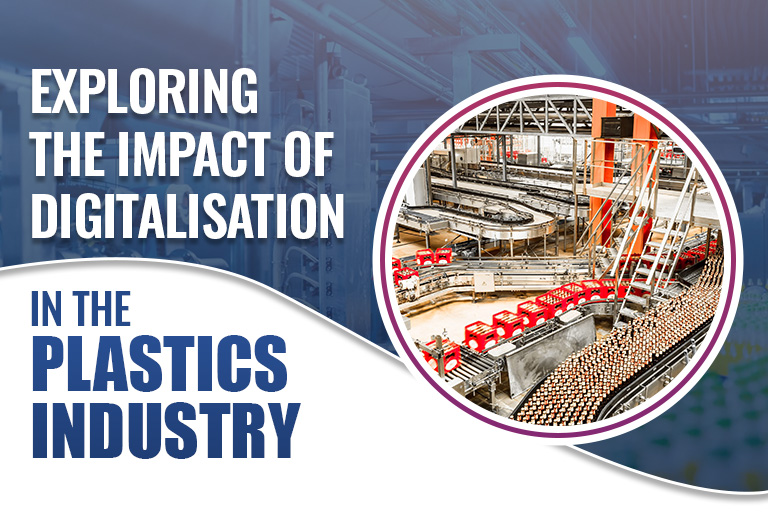Exploring The Impact of Digitalisation In The Plastics Industry
Digitalisation is transforming industries worldwide by revolutionising how businesses operate and interact with customers. This technological shift involves converting analogue processes into digital formats. It also harnesses the power of data, automation, and connectivity. In manufacturing, it enhances efficiency through smart factories, predictive maintenance, and supply chain optimization.
From telemedicine in Healthcare to personalised services in Banking, digitalisation is here to stay. In this article, we look at 11 ways digitalisation is impacting the plastics industry:
- Improved quality control: Advanced digital technologies, such as machine vision systems and sensors, have significantly improved quality control in the plastics industry. These tools can detect defects and irregularities in real-time, helping manufacturers reduce waste. This ensures that finished products efficiently meet strict quality standards.
- Enhanced sustainability Initiatives: Data analytics help organizations assess their environmental impact and identify areas for improvement. Furthermore, digital platforms enable the sharing of sustainability data, promoting transparency and supporting initiatives to reduce plastic waste and adopt eco-friendly practices.
- Enhanced manufacturing efficiency: Digitalisation has streamlined plastic manufacturing processes through automation, robotics, and data-driven insights. Smart factories equipped with sensors and IOT devices optimise production lines, reducing human errors and increasing efficiency. This results in faster production cycles and lower operational costs.
- Innovation in materials development: Digitalisation has accelerated research and development efforts in the plastics sector. Computational modelling, simulation software, and AI-driven analysis enable the creation of new materials with enhanced properties, such as biodegradability or increased strength, meeting evolving consumer and regulatory demands.
- Innovation in automation: Digitalisation has led to the automation of various manufacturing processes, reducing labour costs, improving precision, and increasing production efficiency.
- Enhanced customisation: Digital technologies enable the production of custom-designed plastic products, catering to unique customer demands and reducing waste.
- Boost in waste reduction: Digitization facilitates the reduction of material waste through precise control of manufacturing processes and improved recycling and waste management.
- Streamlining Product Lifecycle Management (PLM) processes: PLM software streamlines product development, from design to end-of-life management, improving collaboration and reducing time-to-market.
- Enhanced market analytics: Data analytics tools provide insights into market trends, enabling businesses to make informed decisions about product development and market positioning.
Discover the latest developments in digitalisation within the plastic industry by joining us at Plastivision 2023. It takes place from December 7th to 11th at the Bombay Exhibition Centre in Mumbai. This event offers an ideal platform for networking with industry leaders and uncovering cutting-edge trends. We eagerly anticipate your participation. For additional event details, don’t hesitate to reach out to the Plastivision team at sanjeevani@plastivision.org or 022 6777 8842/46/48. We’re excited to hear from you soon!
Leave a Reply Cancel reply
Recent Posts
- Understanding The Materials That Are Used To Build Plastic Toys
- All You Need To Know About Food-grade Plastics
- A Glance At The Materials That Boost The Performance Of Plastics
- Understanding The Importance Of Exploring New Business Opportunities In The Plastic Industry
- Understanding The Importance Of Investing in R&D For The Plastic Industry
Categories
- 3D Printing
- AIPMA
- Automation
- Automobile Sector
- Bio Plastics
- Environment
- Innovations In Recycling
- Latest Innovations
- Molds & Dies
- News
- Packaging Industry
- Plastic
- Plastic Application
- Plastic Industry
- Plastic Market
- Plastic Myths
- Plastic News From The World
- Plastic Packaging
- Plastic Products
- Plastic Recycling
- Plastic Solar Cells
- Plastic Toys
- Plastic Waste
- Plastic World
- Plastics
- Plastics And Their Applications
- Plastics In Agriculture
- Plastics In Healthcare
- Plastics In Medical Industry
- Plasticulture
- Processing Machinery
- Recycling Machines
- Robotics
- Uncategorized
- Virtual Reality
Archives
- November 2023 (3)
- October 2023 (2)
- September 2023 (3)
- August 2023 (3)
- July 2023 (3)
- June 2023 (3)
- May 2023 (2)
- April 2023 (2)
- March 2023 (2)
- February 2023 (2)
- January 2023 (2)
- December 2022 (3)
- November 2022 (1)
- October 2022 (1)
- September 2022 (2)
- August 2022 (1)
- July 2022 (3)
- May 2022 (3)
- March 2022 (2)
- February 2022 (1)
- January 2022 (1)
- September 2021 (2)
- August 2021 (3)
- July 2021 (4)
- June 2021 (4)
- May 2021 (3)
- April 2021 (2)
- March 2021 (4)
- November 2019 (8)
- October 2019 (8)
- September 2019 (8)
- August 2019 (8)
- July 2019 (8)
- June 2019 (8)
- May 2019 (8)
- April 2019 (8)
- March 2019 (8)
- February 2019 (11)
- January 2019 (8)
- December 2018 (8)
- November 2018 (12)
- October 2018 (12)

